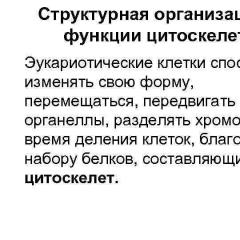Ivan Krylov fable leaves and roots. Fable leaves and roots - Ivan Andreevich Krylov
Leaves and roots drawing
Fable Leaves and roots read text
On a beautiful summer day,
Casting a shadow across the valley,
The leaves on the tree with marshmallows whispered,
They boasted of their density and greenness
And this is how the zephyrs interpreted themselves about themselves:
“Isn’t it true that we are the beauty of the entire valley?
That we made the tree so lush and curly,
Sprawling and majestic?
What would it be like without us? Well, right,
We can praise ourselves without sin!
Are we not from the heat of the shepherd
And we shelter the wanderer in the cool shade?
Aren't we with our beauty?
Do we attract shepherdesses to dance here?
We have an early and late dawn
The nightingale whistles.
Yes, you, marshmallows, are on your own
You almost never part with us."
“We might as well say thank you here,”
A voice answered them humbly from underground.
“Who dares to speak so brazenly and arrogantly!
Who are you there?
Why are they so daring to treat us like that?" -
The leaves began to rustle and rustle on the wood.
"We are the ones -
They were answered from below:
Which, here rummaging in the dark,
We feed you. Don't you really recognize it?
We are the roots of the tree on which you bloom.
Show off in good time!
Just remember the difference between us:
That with the new spring a new leaf will be born,
And if the root dries up, -
The tree will be gone, and neither will you."
Moral of the fable: Leaves and roots
And if the root dries up, -
There will be no tree, no you
Moral in your own words, the main idea and meaning of the fable Leaves and roots
Power depends on the people. Without him there would be no power.
Analysis of the fable Leaves and roots, allegorical meaning.
The fabulist wrote Sheets and Roots in order to convey to people the problems of the state and society, the importance of the common cause, the discrepancy between interests, actions and much more. According to Krylov’s principle, the moral of everything written is contained in the last lines, where long-forgotten “roots” start a conversation. With their words, they remind the young “leaves” that the tree takes the necessary nutrition from them and gives life to new leaves. That is, the top (power) changes, but the roots (common people) remain the same. And as long as the common people are alive, the government and the state will live, and, of course, will develop.
When analyzing and analyzing the fable, you should consider each character separately. The leaves represent the top of society (nobles, merchants, etc.), whispering with the spring wind (passing fleeting rulers). And the roots (simple peasants and workers) do all the work, such as food production and other benefits.
The arrogant, narcissistic and superficial elite of society considers itself the smartest and rightest in all endeavors, which is a wrong decision. In reality, they are just a small part of a large system that are interconnected and individually have no chance of existing.
The fable talks about leaves and roots. About how the leaves show off, forgetting that without roots they could not live.
Heroes of the fable (characters)
- Sheets
- Roots
Listen to Krylov's fable Leaves and roots
Listen to the fable of Ivan Andreevich Krylov
Krylov’s fable “Leaves and Roots” is a deep work about the problems of society, the state, the discrepancy between interests and ideas about one’s importance for the common cause of those who are his driving force and those who represent this society.
Fable Leaves and roots read
On a beautiful summer day,
Casting a shadow across the valley,
The leaves on the tree with marshmallows whispered,
They boasted of their density and greenness
And this is how the zephyrs interpreted themselves about themselves:
“Isn’t it true that we are the beauty of the entire valley?
That we made the tree so lush and curly,
Sprawling and majestic?
What would it be like without us? Well, right,
We can praise ourselves without sin!
Are we not from the heat of the shepherd
And we shelter the wanderer in the cool shade?
Aren't we with our beauty?
Do we attract shepherdesses to dance here?
We have an early and late dawn
The nightingale whistles.
Yes, you, marshmallows, are on your own
You almost never part with us."
“We might as well say thank you here,”
A voice answered them humbly from underground.
“Who dares to speak so brazenly and arrogantly!
Who are you there?
Why are they so daring to treat us like that?" -
The leaves began to rustle and rustle on the wood.
"We are the ones -
They were answered from below:
Which, here rummaging in the dark,
We feed you. Don't you really recognize it?
We are the roots of the tree on which you bloom.
Show off in good time!
Just remember the difference between us:
That with the new spring a new leaf will be born,
And if the root dries up, -
The tree will be gone, and neither will you."
Moral of the fable: Leaves and roots
The moral of Krylov's fable “Leaves and Roots” is in the last lines. The Roots, who have been unfairly forgotten, enter the conversation. They remind the arrogant leaves that it is from the roots that the whole tree receives food, and every “new spring a new leaf will be born” - that is, the government changes, but the people always remain in their place. As long as the roots are alive, the society and the state will be alive.
Fable Leaves and roots - analysis
The analysis of Krylov’s fable “Leaves and Roots” begins with an analysis of the characters. The leaves that whisper to the Zephyrs (“zephyr” is a warm spring wind) personify the top of society. In the time of Krylov, this was, first of all, the nobility, merchants, and clergy. And the Roots are the simple people, peasants and workers who produce food and all kinds of goods.
The “upper class,” cut off from the people, superficial, arrogant, engages in narcissism and boasting. The leaves believe that they are the basis of the life of the Tree. But in fact, they are only part of a system that could not exist without its other elements.
The fable “Leaves and Roots” by Krylov tells about arrogant leaves that do not want to admit their dependence on the roots.
Read the text of the fable:
On a beautiful summer day,Casting a shadow across the valley,
The leaves on the tree with marshmallows whispered,
They boasted of their density and greenness
And this is how the zephyrs interpreted themselves about themselves:
“Isn’t it true that we are the beauty of the entire valley?
That we made the tree so lush and curly,
Sprawling and majestic?
What would it be like without us? Well, right,
We can praise ourselves without sin!
Are we not from the heat of the shepherd
And we shelter the wanderer in the cool shade?
Aren't we with our beauty?
Do we attract shepherdesses to dance here?
We have an early and late dawn
The nightingale whistles.
Yes, you, marshmallows, are on your own
You almost never part with us."
“We might as well say thank you here,”
A voice answered them humbly from underground.
“Who dares to speak so brazenly and arrogantly!
Who are you there?
Why are they so daring to treat us like that?" -
The leaves began to rustle and rustle on the wood.
"We are the ones -
They were answered from below:
Which, here rummaging in the dark,
We feed you. Don't you really recognize it?
We are the roots of the tree on which you bloom.
Show off in good time!
Just remember the difference between us:
That with the new spring a new leaf will be born,
And if the root dries up, -
The tree will be gone, and neither will you."
Moral of the fable: Leaves and roots:
The moral of the story is that if you profit from someone else's work, sooner or later you will have to pay for it - just like what happened with the leaves. They were full of pride and boasted of their beauty, while their nutrition came from roots in darkness. This often happens in reality. For example, rich children enjoy all the blessings of life at the expense of hard-working parents; or the government allows itself a luxurious life, imposing an unbearable burden on the people it rules. But Krylov in his fable gives an edification: if there are no roots, then the whole tree along with the leaves will disappear.Ivan Andreevich Krylov became famous for his fables. These texts are still of great importance. In the fable “Leaves and Roots,” not only the moral deserves attention, but also the plot itself, which is very entertaining.
The plot of the story tells readers how the leaves have a pleasant conversation with the zephyrs (south winds). The latter gently shower them with warm coolness all day long. The main characters of the work boast that they are useful to literally everyone around them: travelers rest under the crown of a tree during intense heat, beautiful girls dance round dances under it and sing songs, and the nightingale sings its unprecedented trills in their greenery.
The revived crown of a tree, which is also capable of reasoning, is an unprecedented miracle, but do not be surprised; for Krylov this is a common thing.
The fable is divided into two parts; the change of action occurs at the moment when the roots of the tree on which the boasting leaves grow wedge into the conversation. The work immediately changes its meaning, which is clearly indicated in the four final lines. The moral of Krylov's fable, rhymed in this last quatrain, draws a comparison with a person. It is people who often demonstrate this behavior: they are proud of their undeserved successes and show disrespect for others.
Likewise, the leaves are so in love with themselves and proud of their beauty and irreplaceability that they cannot think or talk about anything else.
In life we can find many examples of similar situations: a successful artist boasts of his merits, forgetting that behind his popularity is the work of many people.
And the proud leaves, emphasizing their importance, completely forgot what role the roots play. After all, without them there would be neither the tree itself nor its green crown.
In fact, the fable “Leaves and Roots” is a work with a double meaning. The first lies on the surface: a person who achieves success immediately forgets about those who helped him, and relies only on his own abilities. But there is another part of morality that is hidden at the bottom: real talents are most often found in the shadows. In Krylov’s time, and not only then, it was difficult for a person without connections to get to the top, even though he had exceptional abilities.
The roots here are precisely that talented hero who vegetates in poverty and sells his talent to those who have more opportunities, including financial ones. Now he will never see the light of day again. His place is at the bottom. Here it is, the harsh truth of life.
On a beautiful summer day,
Casting a shadow across the valley,
The leaves on the tree with marshmallows whispered,
They boasted of their density and greenness
And this is how the zephyrs interpreted themselves about themselves:
“Isn’t it true that we are the beauty of the entire valley?
That we made the tree so lush and curly,
Sprawling and majestic?
What would it be like without us? Well, right,
We can praise ourselves without sin!
Are we not from the heat of the shepherd
And we shelter the wanderer in the cool shade?
Aren't we with our beauty?
Do we attract shepherdesses to dance here?
We have an early and late dawn
The nightingale whistles.
Yes, you, marshmallows, are on your own
You almost never part with us.”
“We might as well say thank you here,”
A voice answered them humbly from underground.
“Who dares to speak so brazenly and arrogantly!
Who are you there?
Why are they so daring to treat us like that?” —
The leaves began to rustle and rustle on the wood.
“We are the ones,”
They were answered from below:
Which, here rummaging in the dark,
We feed you. Don't you really recognize it?
We are the roots of the tree on which you bloom.
Show off in good time!
Just remember the difference between us:
That with the new spring a new leaf will be born,
And if the root dries up, -
The tree will be gone, and neither will you.”
Heroes
Roots and leaves
Summary
On a beautiful summer day, the luxurious leaves of a certain tree showed off their own density and beauty. They boasted that they provided shade for resting shepherds and attracted singers and dancers under their protection. It was heard from the ground that we should also say thank you. The leaves asked who dared to object to them. In response, they heard that this was stated by the roots of the tree on which the leaves grew. The roots said that they nourished them, that new leaves appeared every spring. And if there are no roots, then there will be neither the tree nor the leaves themselves.
Morality
The most important thing may not be what is in plain sight.
Fable Analysis
History of creation
The fable “Leaves and Roots” was written by I. A. Krylov in 1811 and in the same year published in “Reading in the Conversation of Lovers of the Russian Word.” Hidden meaning fables are most likely relevant to the discussion peasant question"secret cabinet" of Alexander I.
Meaning of the name
The title of the fable is based on the opposition of two completely different worlds: external ostentatious beauty and deep internal forces, which are entrusted with hard, thankless work.
Main theme
The main theme of the work is the denunciation of unfounded boasting and the identification of the true source of life.
The allegorical meaning of the fable is quite transparent. The leaves symbolize the highest Russian society, feeling proud of its brilliance and splendor. They believe that they are a real decoration of the tree, behind which the whole image is hidden. Russian empire. The boasting of leaves is based on imaginary virtues: shelter from the heat, a place for the nightingale to dance and sing. All this does not require any effort from them.
Humble roots represent serf peasantry, never seeing sunlight due to constant hard work. Being constantly in the dark (i.e., in conditions of slavery), the peasants fully provide for the privileged segments of the population. In a broader sense, they provide Russia's power.
The final warning of the roots (“if the root dries up, there will be no tree, nor you”) has a very deep meaning. Changes of rulers, ministers and officials are a common occurrence that does not affect the foundations of the state. Much more terrible could be the consequences of the complete ruin of the overwhelming mass of the population. This should never be forgotten by those who have the power to alleviate the situation of the serf peasantry.
Issues
The fable raises a problem that occupies the minds of many Russian people in early XIX century. The serfdom system not only forced Russia out of a number of civilized states, but also became a serious obstacle to its development.
The neglect of the leaves for the roots indicates the attitude of the landowners towards their forced peasants, who were distinguished from draft animals only by the ability to speak.
Such an inhumane order had to be changed immediately. The author almost openly hints that the Russian nobility itself is cutting off the branch on which it sits.
Composition
The fable is clearly divided into two parts. The first is devoted to the description of the boastful speech of the leaves, the second to the reasonable objection and warning of the roots.
What the author teaches
In addition to the allusion to the situation of the peasants, the fable also contains a general moral and ethical meaning. Very often rich and noble people “forget” how and thanks to what they achieved their position. At the same time, real workers are afraid or embarrassed to declare their rights. Krylov invites readers to figure out the question themselves: which of them deserves more respect?



